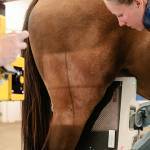Equine Osteoarthritis Treatment, Prevention: Silicon Study

When we think of management strategies for osteoarthritis in horses, silicon likely doesn’t come to mind. Researchers recently investigated if dietary supplementation of silicon positively affects bone and cartilage of mature horses.*
Silicon, a chemical element in the same family as carbon, supports long bone development and mineralization, and increases collagen synthesis. In addition, silicon appears to affect the absorption of calcium and other minerals needed for normal bone mineralization. Silicon shows promise in some studies for influencing the development and progression of osteoarthritis and reducing lameness.
In one recent study, mature, sedentary horses were offered a silica-collagen peptide supplement for 84 days. Supplementation did not improve either lameness or radiographic evidence of osteoarthritis. Further, supplemented horses did not have altered articular cartilage “turnover,” a requisite for the continued production of healthy cartilage.*
“Instead of silicon, other oral joint health supplements, such as glucosamine, chondroitin sulfate, hyaluronic acid, and omega-3 fatty acids, should be the first-line products that owners and managers of performance horses select,” explained Kathleen Crandell, Ph.D., a nutritionist at Kentucky Equine Research. “These products, when administered appropriately, are an effective part of a multi-modal treatment approach to osteoarthritis.”
*Pritchard, A.., B.D. Nielsen, C. Robison, and J.M. Manfredi. 2020. Low dietary silicon supplementation may not affect bone and cartilage in mature, sedentary horses. Journal of Animal Science 98(12): skaa377. doi: 10.1093/jas/skaa377.








